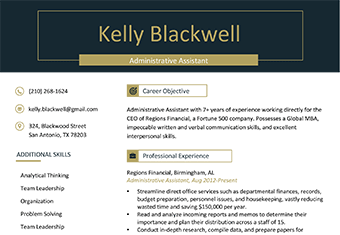What is a Reference?
Simply put, a reference is a person, possibly a previous employer, teacher or even a co-worker or friend that is willing to vouch for all of the awesome abilities and achievements you laid out so beautifully in your resume skills section. Employers and educators will sometimes ask for references to get a fuller picture of an applicant’s attributes and personality, or to ensure that the candidate is not lying on their resume.
If requested, your reference’s details will be listed on your resume or job application with their main contact details: Full name, company or educational institution, phone number and/or email address.
Where is a Reference Written on the Resume? You Have Two Options:
1. At the bottom
If a reference is requested, you should write your references at the bottom of your resume in a new section called “References” or “Recommendations”. Your references are the least important part of your resume, especially compared to your professional experience and education sections.
2. Under your individual experiences
There are other ways you can write your reference(s) on your resume. Consider placing your reference contact details under each job position instead. By doing this, you can save valuable space on your resume, as you won’t need a new “References” section. It also helps the Hiring Manager who is reading your resume to easily connect each reference to the company they are listed under.
When to Write References on a Resume?
Some professions are more likely to be accepting of references on the resume. These include:
- Academics: Especially professors, teachers, students applying to college or university and academic researchers, and who may even be writing functional resumes
- Candidates with little work experience: References help to bulk out the resume and also allow a HR Manager to find out more about your personal profile due to the lack of work history on the resume
- Government positions: A resume is not usually the standard form of application for government roles but you may be expected to write your references on their application form
When NOT To Write References on a Resume?
If an employer explicitly states in their job description “References not required” or anything along those lines, don’t include your references. If you do, it will work against you, because it will seem like you don’t know how to follow instructions.
Not to mention, you’ll just be wasting valuable resume space, where you should be bragging about your stellar achievements and those additional skills that could make or break your chance for an interview.
Why wouldn’t employers ask for references upfront?
Interestingly enough, according to The Society of Human Resource Managers, 53% of resumes and job applications contain at least one falsification. At first glimpse of this you may expect most employers would like you to write your references on your resume, but you’d be wrong.
In reality, contacting references is a tedious task for most jobs, unless they are critical and difficult positions. In the vast majority of cases, employers will use their best judgment while interviewing you. Most employers are confident in their abilities to narrow down suitable candidates, and discover in the by the interview stage whether you have lied on your resume.
You may get asked for references after your interview
If you’ve reached the interview stage, that means your competition is much thinner, and it’s becoming harder for management to decide who to hire. It’s at this stage that you may be asked to provide references.
What About Using “References upon Request” on a Resume?
This is the equivalent to writing “I’m available for interview, upon request” or “I’ll wake up out of bed an hour early to get to the interview, upon request”.
To us, there’s just no point writing this on your resume, the employer is usually fully aware they can request references from you if needed. Save the space on your resume, highlight your great qualities instead and be prepared to provide references when and if an employer requests them.
4 Extra Resume Reference Tips
1. Clarify the request for references
If an employer requires references, make sure to find out if they require professional references (previous employers and educators) or personal references (friends, family and possibly co-workers).
2. Be polite – get permission from your references first
Make sure you ask permission of the references you have listed either on your resume or on your separate piece of paper. In fact, be sure to let them know a possible time range a Hiring Manager may call them, so they can be prepared to provide a glistening reference about you.
3. Be strategic – make sure your references are ready to give you glowing reviews
Of even more importance, check with each and every one of your references if they will provide a strong recommendation of your overall profile. The fundamental question may be do they know you well enough?
4. Make sure you have enough references
An ideal amount of references would be three personal and three professional references, but no more than that.
Best of luck at your next interview!







